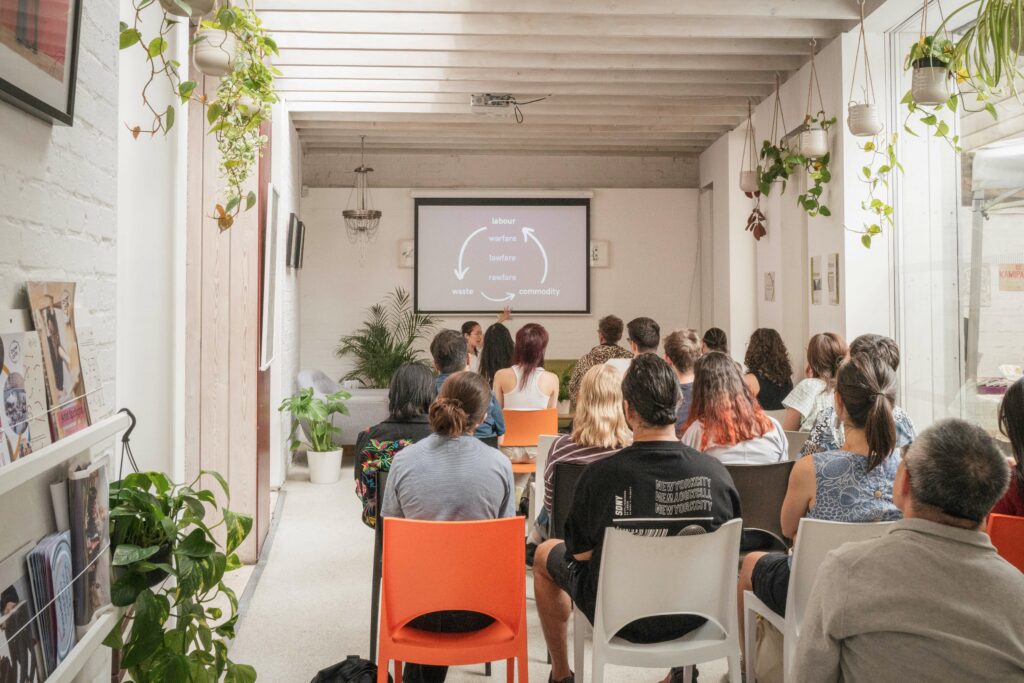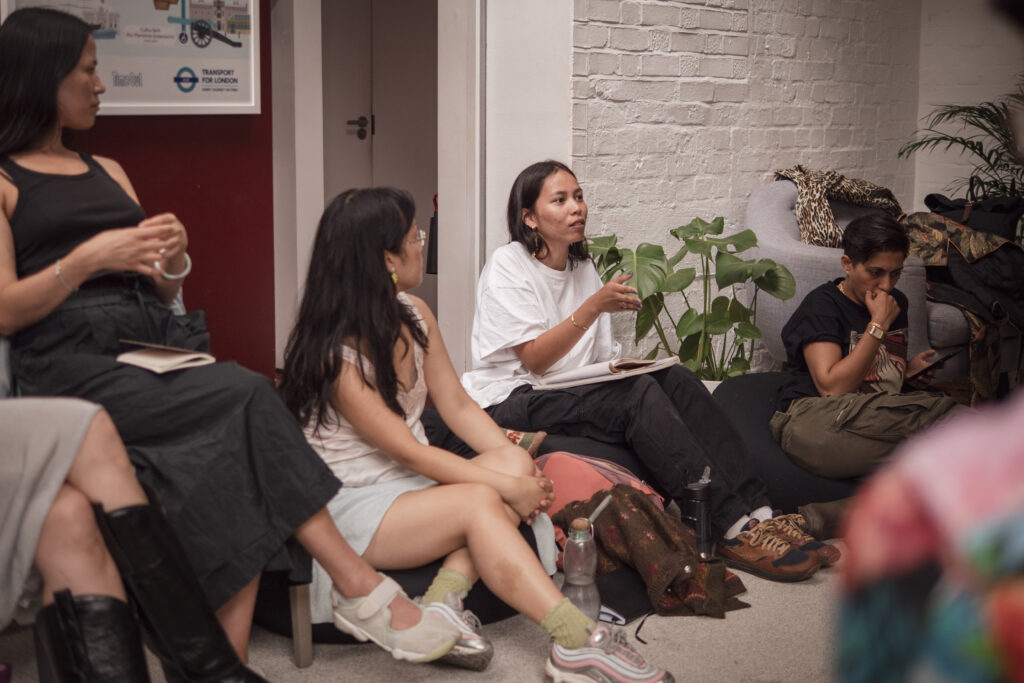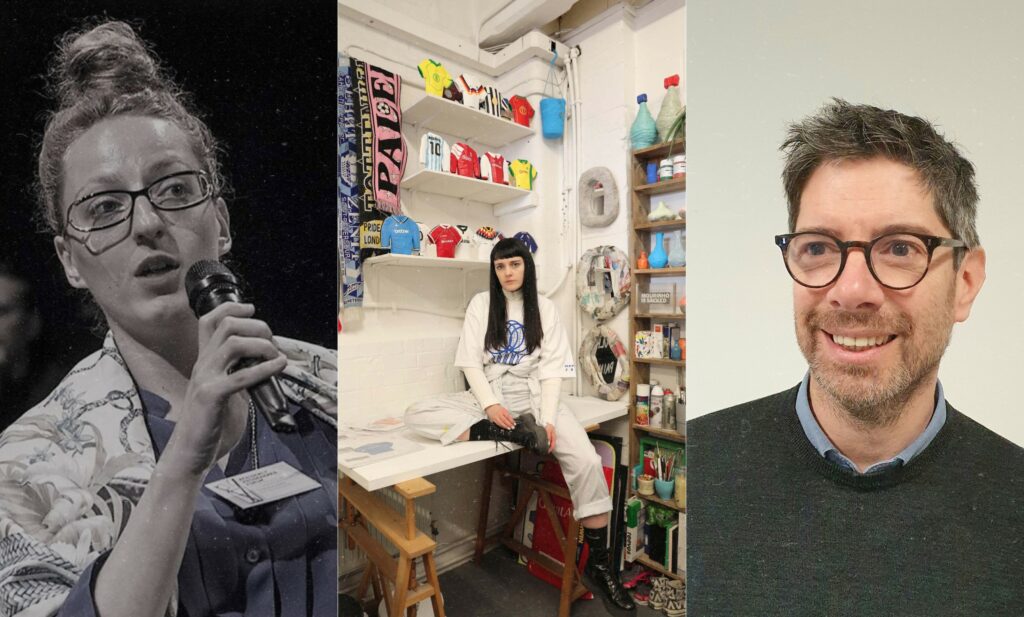
- This event has passed.
Knowledge exchange lab: Earthly Values – Art, Research and Co-Existence with UCL East
Tuesday 30th January 2024 , 5:30pm to 8:30pm
THIS EVENT IS NOW SOLD OUT. PLEASE EMAIL NUNNERY@BOWARTS.COM TO BE ADDED TO THE WAITLIST.
Join us as we explore the relationship of the arts, research, and the planet, and climate justice. We will be delving into how we as artists, researchers and academics partake in the creative solutions which contribute to the sustainable legacy in east London.
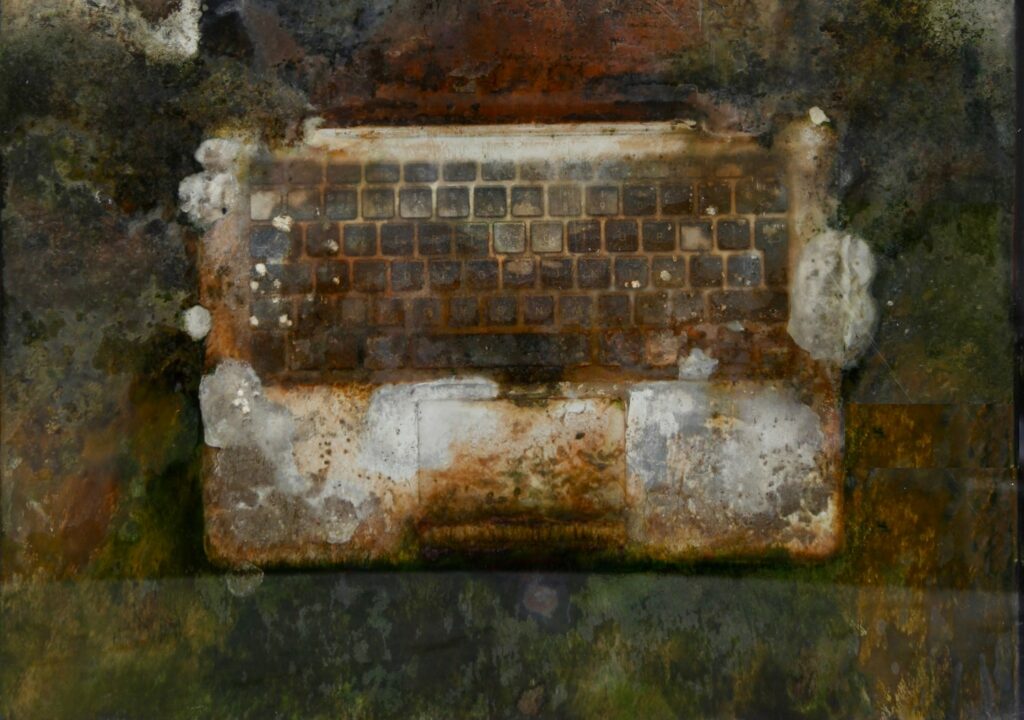
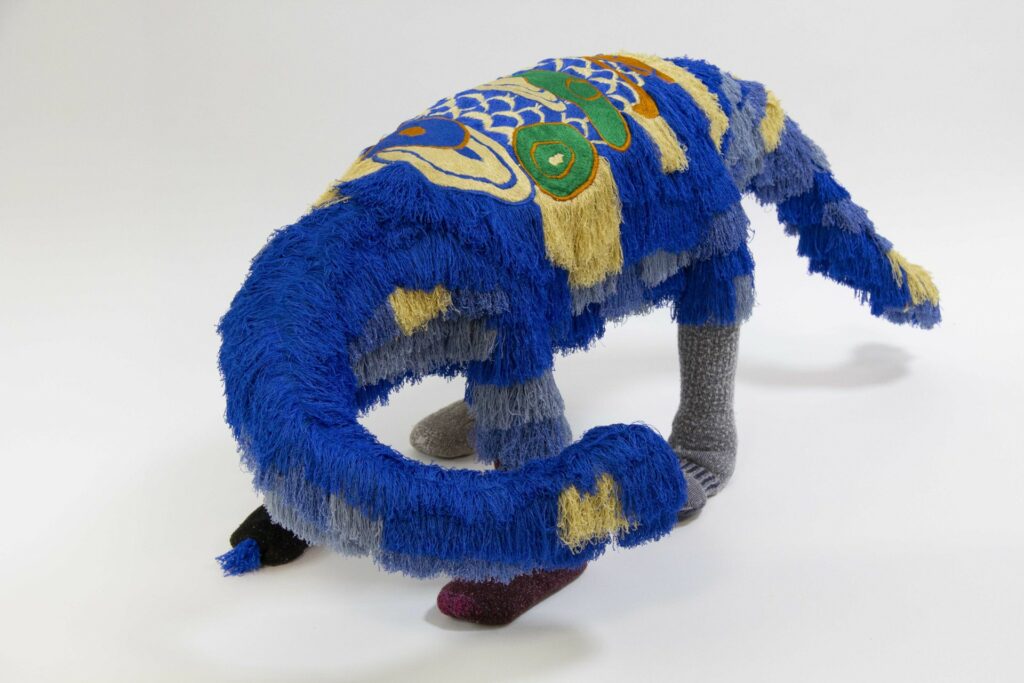
UCL’s Cultural and Community Engagement team is collaborating with Bow Arts to continue this series of learning and networking events bringing together artists, researchers, and local communities. Inspired by ‘Gaia’ the permanent work by Luke Jerram in the UCL East campus, this event will hear from speakers whose work explores big questions relating to the world we live in and the future of our Planet.
Participants will hear from a panel of speakers whose work touches on a range of themes and issues which relate to the themes of ‘Gaia’. The panel conversation will be followed by a Q&A and informal networking.
This is a fantastic opportunity to connect with others in the room to collectively work and think through some of the questions raised and reflect on our own interactions with the planet and the legacies we leave behind.
Activations on the night:
- Hear from East London Art Prize shortlisted artist Woo Jin Joo and the exploration into her multidisciplinary practice, informed by traditional East Asian folklore, mythology, and philosophy. Woo Jin considers the ways in which humans place value on objects in our materialist and consumerist society, as she explores alternative ways of existing and interacting with the found objects.
- Fellow shortlisted artist David Aston will share thoughts related to his work The Anthropocene Globe, archived histories and our current digital age. His work Pergamon II, gives rise to the interplay between material cultural and digital culture. Further he will explore the Plastic Age and our unintended consequences of plastic consumption.
- We will be joined by UCL researchers Leah Lovett and Andy Hudson Smith (Centre for Advanced Spatial Analysis). Leah explores the use of arts-led methods by bridging knowledge systems and engaging people with questions of spatial and environmental justice. Andy has a research focus on location based digital technologies he has been at the forefront of web technologies for communication, outreach and linked to the digital built environment. Together they have recently created Tellus Mater, installed in UCL’s new Marshgate building, an interactive AI that acts as Mother Earth integrating text with archival images of botanical gardens. She will be joined by fellow academic, Professor Andrew Hudson-Smith, Director of The Bartlett Centre for Advanced Spatial Analysis and a Professor of Digital Urban Systems.
- Additionally, you will have the chance to view Ufuoma Essi’s film Pastoral Malaise. This meditative piece explores pastoral environments and rural Britishness, through an imagined relationship to the English landscape conveyed through memories and speculative histories.
Please note there will be filming and photography taken at this event for UCL internal reporting and for sharing in print and social media.
This event will take place in the Staff Common Room at UCL East -Marshgate, 7 Sidings Street, London E20 2AE
THIS EVENT IS NOW SOLD OUT. PLEASE EMAIL NUNNERY@BOWARTS.COM TO BE ADDED TO THE WAITLIST.
More about David Aston
David Aston is a British artist who’s mixed-media practice lies at the intersection of art, anthropology and technology. Examining society through a diachronic lens, he raises questions about our collective humanity at a time of accelerated change. His multimedia works observe our transition to an age where we need to attest our humanity to machines, proclaim our rights to data, question our cultural legacy through acts of digital archaeology, and experiment with AI futurist possibilities, predictions and gamification.
More about Woo Jin Joo
Woo Jin Joo (b. 1995) is a Chinese/Korean artist based in London. Woo Jin received her BA Textiles from Central Saint Martins in 2019 and MA Textiles from Royal College of Art in 2021. Woo Jin’s multidisciplinary practice takes cues from traditional East Asian folklore, mythology and philosophy, exploring ways of re-enchanting stories of the objects and the world around us through these lenses.
Mediating on the value humans endow objects in our current materialist and consumerist society, Woo Jin playfully postulates a new way of living, being and learning from objects – one that is more caring and lasting. In her work, she subverts the more traditional, gently-spoken character of soft sculpture and textile, instead using them as conduits and means of engaging in the discourse around climate justice, capitalism, and more generative ways of living.
Woo Jin has recently been awarded the Fine Art Textiles Prize, Elephant Trust Fund, Art Council’s Developing Your Creative Practice Fund, A-N Artist Bursary, was the runner-up for the Hari Art Prize, and shortlisted for the East London Art Prize. Her work has been exhibited at Wereldmuseum Rotterdam, Staffordshire St Gallery, JGM Gallery, London College of Fashion, and more.
More about Ufuoma Essi
Ufuoma Essi Is a video artist and filmmaker from Lewisham, South East London. She works predominantly with film and moving image as well as photography and sound.
Her work revolves around Black feminist epistemology and the configuration of displaced histories. The archive forms an essential medium for her as an artist and it’s through explorations with the archive that she aims to interrogate and disrupt the silences and gaps of political and historical narratives. By using the archive as a process of unlearning and discovery she seeks to re-centre the marginalised histories of the Black Atlantic and specific histories of Black women. Drawing from a range of influences including Black popular culture, films, music, historical texts and Black feminist theory from writers such as Claudia Jones to Daphne Brooks. Essi’s work also seeks to examine the historical and contemporary links between the Black Atlantic and explores intersectional themes.
More about UCL East
Since 1826, UCL has championed independent thought and broken boundaries in research to make a positive impact in London and across the globe. It was the first university to welcome students of all faiths, or no faith, and the first to educate women on a fully equal footing with men. UCL’s new university campus, UCL East, is the next chapter in our disruptive thinking and the biggest development in our nearly 200-year history. Located on Queen Elizabeth Olympic Park, it will give us the scale and space we need to continue our disruptive thinking and find solutions to the biggest problems facing people and the planet.
When fully open, around 4,000 students and 700 staff will work together and collaborate with local communities and businesses in cutting-edge new research centres specialising in ecology, robotics, AI, urbanism, culture, assistive technology, engineering, culture, heritage and health. UCL East’s One Pool Street base, opened in the autumn of 2022, is full of multidisciplinary research labs and studios with a lecture theatre doubling as a cinema, a shop, café and accommodation for more than 500 students.
Our UCL East campus will be accessible, sustainable and open to the public, with community engagement and exhibition spaces, and specially commissioned art by local artists for everyone to enjoy. UCL East is part of East Bank, London’s new culture, education, innovation and entertainment district, a legacy of London 2012. UCL East wants to be embedded in the local, east London community, and has been working for 10 years to build relationships and collaborations here.
Access information
If you have any questions regarding accessibility at this event or would like to make us aware of any access requirements that you have in advance of visiting, please email Briony on b.fleming@ucl.ac.uk
Access requirements could include things like providing equipment, services or support (e.g. information in Easy Read, speech to text software, additional 1:1 support), adjusting workshop timings (e.g. more break times), adjustments to the event space (e.g. making sure you have a table near the entrance) or anything else you can think of!
About the East London Art Prize Events programme
The East London Art Prize events programme is a dynamic, free public programme open to all, which builds on the Prize’s ethos of providing ongoing support, development, and networking opportunities for artists in east London and beyond.
Featuring a constellation of workshops, talks, panels, lates, socials, labs, walks, and takeovers in collaboration with our Prize partners and featuring some familiar faces from our inaugural shortlist of 12 fantastic artists, this year’s events programme celebrates and pays homage to the huge abundance of talent and creativity nestled in east London.
These events have been developed in collaboration with our Prize partners the British Council, The Line, London College of Fashion (LCF), London Legacy Development Corporation, University College London (UCL), V&A East, Whitechapel Art Gallery, and Dulux.
Find out more about the wider programme here.
More about the East London Art Prize
The East London Art Prize is an all-media art prize designed to showcase the talent of artists working and living in east London, with an accompanying event programme supporting artists’ careers and opportunities. The Prize is generously funded by Minerva and Prue MacLeod. Find out more on the Prize webpage here.
